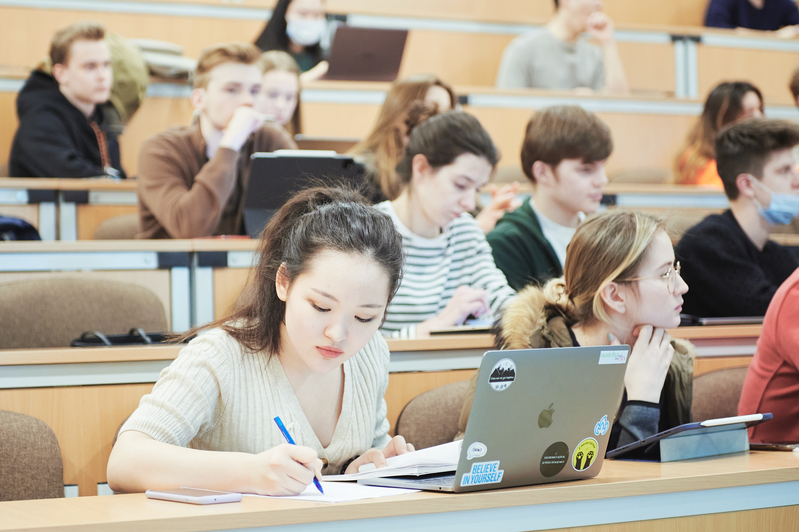Russian and Chinese Scholars Share Experience of Transformation of Doctoral Education

The Russian and Chinese postgraduate education systems originally borrowed their institutional frameworks from the Soviet Union. However, in the 21st century, they have evolved along different paths. While key performance indicators for postgraduate programmes in Russia are declining, China is seeing a rapid increase in the number of postgraduate students. These contrasting trajectories and the reforms undertaken in each country in recent decades were the focus of a roundtable discussion held as part of the 25th Yasin (April) International Academic Conference.

Evgeniy Terentev
The roundtable was part of a major research project titled ‘Transformation of Doctoral Education in China and Russia,’ conducted jointly by the HSE Institute of Education and the Institute of Education at Tsinghua University. The session was moderated by Evgeniy Terentev, Director of the HSE Institute of Education.
Professor Ma Yonghong, Director of the Graduate Education Research Centre at Beihang University's Institute of Higher Education, emphasised that over the past fifty years, China has been adapting its system for training researchers to meet the evolving needs of the economy and society. Previously limited to individual universities, both academic and professional postgraduate education are now being developed on a national scale. In several key areas, China’s model has outperformed many of its European counterparts.
A new wave of reforms launched in 2019 aims to improve the quality of postgraduate training, shifting the focus from the number of publications to the quality of dissertations—particularly the significance and practical value of research outcomes. Requirements for academic supervisors have been tightened, financial and organisational support for students has been enhanced, and the management system has been improved. Professional postgraduate education is being introduced, with plans for professional degrees to account for up to one-third of all awards by 2025.
‘These measures are designed to make postgraduate education a source of strategically important professionals for priority sectors—from fundamental science to high-tech manufacturing,’ Ma Yonghong noted.

Wang Chuanyi, Deputy Director of the Research Centre for Education Strategic and National Planning at Tsinghua University and a contributor to the ‘Transformation of Doctoral Education in China and Russia’ project, reflected on the initial efforts to develop scientific training in post-war China, paying particular attention to the expansion of postgraduate education in the 1970s, including the establishment of a regulatory framework. The second part of his report focused on the changes initiated in the late 1990s and still ongoing today.
Wang Chuanyi highlighted China's intensified efforts to combat academic misconduct and the establishment of a ‘five-mode’ quality assurance system based on cooperation among universities, government agencies, professional associations, industry, and civil society institutions.
Concluding his presentation, the researcher stated that by 2030–2035, China aims to secure global leadership in doctoral education by increasing the proportion of postgraduate students within the overall student population, focusing on priority areas in science, technology, and medicine, and developing an integrated model of cooperation between the state, universities, industry, and science to train strategically important personnel.

Nikolay Rybakov, Associate Professor at the Centre for Research in Science and Postgraduate Education Development, Lobachevsky University (Nizhny Novgorod), spoke about the impact of the 2013–2015 reforms of postgraduate education and dissertation councils in Russia on PhD thesis defences.
As part of this reform, postgraduate studies were formally classified as a level of education. A large educational component was introduced, and the defence of the candidate dissertation was removed from the standard curriculum. Graduates instead defended a qualifying project that did not result in the awarding of a degree, and took a qualification exam that assessed their teaching competencies. Simultaneously, the requirements for awarding academic degrees were significantly tightened.
As a result, from 2013 to 2021, admissions to postgraduate programmes in Russia fell by 28%, the total number of postgraduates dropped by 32%, the number of graduates declined by 59%, and the proportion of graduates who completed their studies with a successful dissertation defence fell by 61%. The social sciences and humanities were hit harder than the natural sciences.

Nikita Smirnov
Nikita Smirnov, Junior Research Fellow at the HSE Centre of Sociology of Higher Education, presented findings from a study on the effectiveness of grant support for doctoral students under the Russian Foundation for Basic Research (RFBR) programme in 2019–2020.
The study showed that receiving a grant had a significantly positive effect on the likelihood of successfully defending a PhD thesis—increasing the probability by 70% compared to those who did not receive a grant, all other factors being equal. Nikita Smirnov attributes this to the fact that a grant reduces the need for outside employment, allowing students to focus on their dissertations, and also helps mitigate negative psychological effects, as receiving a grant serves as a form of academic recognition.
The grant also positively influences timely thesis defence and publication activity—an effect that Prof. Ma Yonghong also noted in relation to practices in China. However, the conclusion that targeted grant support is a valid tool for enhancing postgraduate performance and research productivity comes with two caveats. First, the format of the programme is crucial—the grant must be long-term and specifically targeted. Second, the relative weight of various forms of support remains unclear: according to Nikita Smirnov, further research is needed to better understand the combined impact of individual and environmental predictors of success.
Summing up the roundtable, Evgeniy Terentev noted that this is just the beginning of a broader discussion on the development of doctoral education in different countries, and that participants would continue the dialogue across various platforms.
‘China and Russia face major challenges and hold significant ambitions for improving the postgraduate education system—not just in terms of meeting specific performance indicators, but in strengthening its overall contribution to the scientific and technological advancement of our countries,’ concluded the Director of the HSE Institute of Education.
See also:
Under a Blooming Magnolia: How Russian and Chinese Scientists Create Solar Cells of the Future
Schola continues to introduce the winners of the International Academic Cooperation competition. In today's issue, Professor Andrey Vasenko, Deputy Head of the Scientific and Educational Laboratory of Quantum Nanoelectronics at Tikhonov Moscow Institute of Electronics and Mathematics (MIEM), speaks about the joint project between his laboratory and the Peking University research team— ‘Engineering of highly efficient and stable perovskite solar cells.’
Graduate School of Business MBA Students Take Part in Offsite Module in China
MBA students of the HSE Graduate School of Business HSHSE have recently completed the international component of their studies at the School of Economics and Management at Tsinghua University. The module focused on developing business through innovation. The participants discussed the impact of new technologies on corporate structures and visited companies operating in robotics and renewable energy.
‘Start Working on Your Articles from the Very Beginning of Your PhD’
Andrés Castañón Rincón, from Spain, is a doctoral student at the HSE School of Philosophy and Cultural Studies in Moscow working on the history of Soviet Marxism philosophy. In his interview with the HSE News Service, he explains why studying Soviet Marxism is relevant today, talks about the advantages and challenges of his work in Moscow as an international researcher, and gives some advice to beginner PhD students.
Meeting with Xinhua Delegation: Discussion on Contemporary Journalism at HSE
On October 22, 2025, HSE University hosted an open meeting with representatives of the Chinese news agency Xinhua, led by Sun Zhiping, Chief of Staff to the Director General. Participants discussed current challenges in journalism and the operational specifics of news agencies in today’s media landscape. Many students took the opportunity to ask questions and practise speaking Mandarin. The visit was organised by the Faculty of World Economy and International Affairs in collaboration with the HSE Institute of Media and the TASS news agency.
HSE Participates in Conference on International Exchange of Professionals in China
From October 21 to 24, 2025, the 23rd Conference on International Exchange of Professionals took place in Shanghai and Beijing, bringing together more than 7,000 scientists and experts from around the world. HSE University was represented by Ivan Arzhantsev, Dean of the Faculty of Computer Science, and Vasily Gromov, Head of the Laboratory for Semantic Analysis of the Centre for Language and Semantic Technologies.
Applications to Participate in April International Academic Conference Now Open
HSE University is now accepting proposals to present academic reports at the XXVI April International Academic Conference named after Evgeny Yasin. Applications can be submitted until December 16, 2025. The conference events will take place mainly on-site in Moscow from April 14 to 17, 2026.
‘It Was Interesting to See How Our Chinese Colleagues Work’: HSE Researchers Take Part in Hefei Summer School
This summer, Diana Sukhoverkhova, Daria Mazur, and David Kagramanyan, research assistants at the MIEM HSE Laboratory for Computational Physics, spent five weeks in China. At the Future Scientist Exchange Program (FuSEP) summer school in Hefei, they worked in new fields of science together with their Chinese colleagues. HSE's promising scientists spoke to the HSE News Service about their intense and productive time in China.
Works of HSE Art and Design Students Presented at Pingyao International Photography Festival
On September 19, the 25th Pingyao International Photography Festival (PIP) opened in Pingyao, Shanxi Province, China. The exhibition features the works of 16 students of the Faculty of Creative Industries at the HSE Art and Design School, selected following the results of the HSE Creative Open / Photoproject international competition, which received more than 300 entries.
‘I Wish Summer Were Quarterly’
Practicing and teaching yoga, chilling in Moscow parks, writing academic papers, travelling around Russia, and volunteering—these are only a few of the things HSE international students have tried over their summer break. Now, as they are getting back to studies, the students reflect on their summer experiences in academic work, professional development, travel, and leisure.
Ringing in the New Term
On September 1, campuses across Russia ring in the new academic year with the traditional ‘first bell’—flowers for teachers and welcomes for first‑years—while international students at HSE University share how studies begin in their home countries, from Ghana’s Akwaba week to China’s student club fair, the Democratic Republic of the Congo’s blue-and-white uniforms, and India’s Teachers’ Day.


